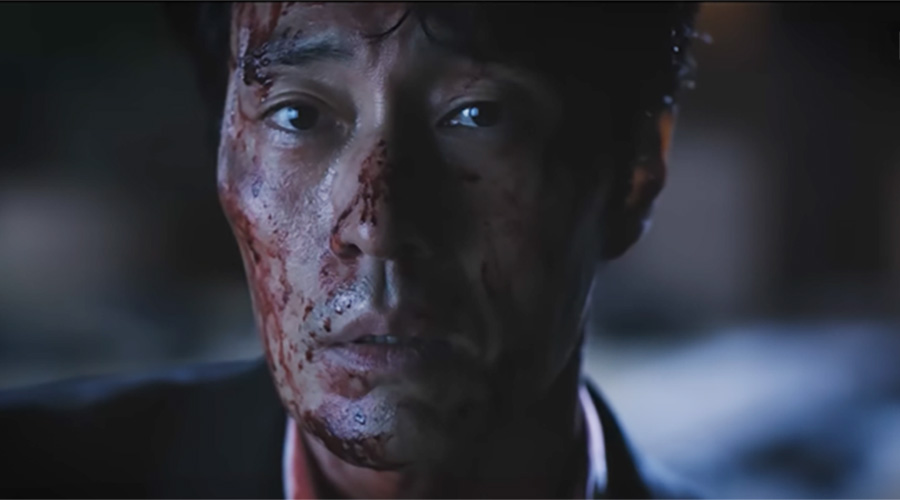Crime-action? Not usually my cup of tea. I’m the type who falls apart when someone simply whispers, “Don’t go,” with tears in their eyes. You think I can handle back-alley gang wars and bone-crunching brawls? But then came Mercy For None. And before I could say “pass the popcorn,” I was hunched over like a gremlin, whisper-screaming, “Punch him again, oppa!”

I didn’t even mean to start it. One minute I was browsing for something light. The next, I was sucked into a gritty underworld of revenge, betrayal, and blood-soaked knuckle sandwiches.
And I wasn’t mad about it. I was full-on invested. Rearranged-my-weekend-plans invested.
My inner softie had been hijacked by sheer cinematic rage and emotional wreckage.
From Digital Panels to Dramatic Punches: The Webtoon Connection
So, is Mercy For None based on a webtoon?
Yes. Absolutely. This K-drama adapts Plaza Wars: Mercy For None (or just Plaza Wars), created by writer Oh Se-hyung and illustrator Kim Gyun-tae. This dark, gritty manhwa hit Naver in 2020 and quickly gained a cult following among action-noir fans.
The manhwa blew up because it felt like someone grabbed every suppressed grudge, layered it with daddy issues, and dunked it in psychological gasoline. Boom. Instant hit.
Korean readers devoured the gritty gang politics, and once it was translated, global fans followed with hearts pounding and popcorn flying.
Korean readers devoured the gritty gang politics, and once it was translated, global fans followed with hearts pounding and popcorn flying.
“Manhwa” is simply the Korean word for comics, while “webtoon” refers to the digital comic format specifically designed for scrolling on smartphones. This one happens to be both, and it’s one of the stronger examples of how to do a manhwa-to-drama adaptation right.
Plus, the original creators were reportedly involved in the adaptation process, so fans of the webtoon can rest easy knowing the K-drama version didn’t stray far from its source.
Not Your Average Webtoon Adaptation
Now, I know what you’re thinking: “Another webtoon adaptation? Haven’t we had enough?”
Believe me, I’ve rolled my eyes too. There are more webtoon-to-drama adaptations than there are ramen flavors at a Seoul convenience store.
But Mercy For None isn’t just another warmed-up manhwa meal.
It’s not like those pretty-boy high school dramas that get slapped together just because the original had cute drawings. This one’s got grit, heart, and actual plot progression. No offense to those other titles, but Mercy For None feels like it was made with care, not just market strategy.
Remember Itaewon Class or Weak Hero Class 1? Yeah, those were good. But this? This takes the blueprint and sets it on fire.
The pacing is tight, the emotions are loud, and the action scenes are basically emotional therapy with fists. You can practically hear the source material breathing through every frame.
The pacing is tight, the emotions are loud, and the action scenes are basically emotional therapy with fists. You can practically hear the source material breathing through every frame.
What really impressed me was how it didn’t just copy the webtoon panel-for-panel. It built on it. Expanded motivations. Polished arcs. It gave the manhwa’s rough edges a cinematic glow-up without sanding off the soul.
You know that one friend who always nitpicks when a book gets turned into a movie? Even she would shut up for this one.
Noir, But Make It Korean (and Extra Poetic)
Ah, noir. The genre that sounds like you’re whispering something mysterious in French. Pronounced “nwar,” it’s not just an excuse to dim the lights and throw in some rain.
Noir is cinematic moodiness turned all the way up. Think morally gray characters with tragic backstories, smoking in alleyways, and monologuing about lost causes while jazz plays softly in the background. The shadows aren’t just there for aesthetic. They represent all the things you don’t want to say out loud.
Korean noir takes it to a whole new level. It’s not just about crime. It’s about generational guilt, honor, revenge, and choices that scar deeper than any blade. It’s the kind of storytelling that grabs your heart, yanks it through the mud, and then politely hands it back in a tissue.
In K-dramas, noir is less “bang bang” and more “why does this emotionally repressed gangster cry over noodles?” It’s brutal. It’s poetic. And honestly? It hurts so good.
These Characters Are Trouble (and We Love It)
● Is “When Life Gives You Tangerines” A Webtoon?
● Is “Newtopia” Based On A Webtoon?
● Is “Mercy For None” Based On A Webtoon?
● What Is The Story Of “Nine Puzzles” About?
● What Is The Story Of “Buried Hearts” About?
● What Is The Story Of “Friendly Rivalry” About?
● Is "Hyper Knife" Based On A Webtoon?
● “Friendly Rivalry” Ending Explained: Did We Get Closure Or Just More Questions?
● Is “The Potato Lab” Based On A Webtoon?
● Is “When Life Gives You Tangerines” Based On A True Story?
The plot stays faithful. The characters feel lifted from the panels.
Nam Gi-jun, the emotionally scarred ex-gangster, carries the weight of every bad decision he’s ever made. So Ji Sub portrays him with a quiet storm energy that simmers and explodes when needed.
Nam Gi-seok, the loyal younger brother, is played by Lee Jun Hyuk. His bone structure should be illegal, and his emotional loyalty had me ugly crying into my hoodie.
Lee Ju-woon, the aging crime boss, is brought to life by Huh Joon-ho. He’s wise, scary, and permanently looks like he knows your darkest secret.
The revenge plot drags Nam Gi-jun back into Seoul’s crime scene after his brother’s death. What follows is betrayal, power plays, and existential dread.
Gu Jun-mo, the unhinged heir to a rival gang, barrels into scenes like a caffeine overdose. Gong Myoung plays him with chaotic brilliance.
Lee Geum-son, the prosecutor-slash-villain with deep-rooted trauma, is played by Choo Young-woo. He makes spreadsheets feel threatening. That’s talent.
Not Korean? Still Obsessed? SAME.😊
💖Join the ultimate newsletter for non-Korean K-drama fans who feel all the feels, every week.
Each of them is cast to kill. Maybe literally.
The revenge plot drags Nam Gi-jun back into Seoul’s crime scene after his brother’s death. What follows is betrayal, power plays, and existential dread. And I was there for every second. I couldn’t stop watching. Even when my ramen went cold.
More Than Just Panels: A World Built on Pain, Power, and Poetry
The K-drama doesn’t just copy the webtoon. It deepens it and then breaks your heart with it.
Backstories don’t just add context … they twist the knife. Characters are given more space to unravel, rebuild, and ruin you emotionally. You know those quiet scenes where no one speaks, but you feel like sobbing anyway? Yeah, Mercy For None has those in spades.
The cultural layers are the unsung heroes here. Understanding Korean hierarchy makes the tension hit differently. A younger man speaking too bluntly to an elder? That’s not just disrespect. That’s social suicide. And when that dynamic shifts, when fear becomes power … it’s deliciously explosive.
It’s also about space. The drama uses physical locations brilliantly. Rooftops, tiny alleyways, and underground lairs aren’t just settings. They mirror the claustrophobia of grief, regret, and powerlessness.
And the symbolism? Subtle but sharp. Blood splattered on pristine suits. Rain pouring during betrayals. Mirrors reflecting more than just faces. It’s artistic violence with emotional precision.
Mercy For None doesn’t just show pain. It lets it breathe. And that, my fellow drama lovers, is why we stay glued to the screen with tissues in hand.
Faithful, Fierce, and Fiercely Personal
Mercy For None sticks close to its manhwa roots, but it doesn’t stop at replication. It elevates them with emotional fireworks and a dash of cinematic sorcery.
The major story beats? Present and powerful. Emotional arcs? Preserved and layered with just enough dramatic flourish to make me pause and whisper, “I need a moment.”
But let’s talk about the action. Oh, the action. It’s raw. It’s violent. It’s the kind of choreography that makes you flinch and clutch your snack bowl. One fight scene had me so rattled, I accidentally threw my bag of popcorn.
And no, you don’t need to read the webtoon first. The drama is completely satisfying on its own.
And no, you don’t need to read the webtoon first. The drama is completely satisfying on its own. But if you’re the kind of viewer who likes finding Easter eggs and appreciating the source material’s DNA running through every scene? You’re in for a layered treat.
For me, watching the K-drama after reading the webtoon felt like getting the deluxe emotional edition. The nods, the expansions, the subtle character tweaks … they all screamed, “This is for the fans. The ones who bled ink and tears over every panel.”
Final Verdict: One of the Good Ones (Trust Me, I Checked Twice)
Yes, Mercy For None is based on a webtoon. And yes, it’s one of the few that gets it right.
If you loved gritty K-dramas based on manhwa like My Name, Vincenzo, or A Model Family, you’ll binge this in record time. It’s gritty, emotional, and utterly satisfying.
I’m still a romance girl at heart. But after this? I might be a noir convert with trust issues and a new playlist of jazz-in-the-rain vibes.
Share this with your K-drama circle, especially that one friend who only watches rom-coms. She needs this emotional damage.
And hey, don’t ghost me! Drop a comment, hit that share button, and subscribe if you want more K-drama scoops served with sarcasm, heart palpitations, and a side of kimchi.
Not Korean? Still Obsessed? SAME.😊
💖Join the ultimate newsletter for non-Korean K-drama fans who feel all the feels, every week.








